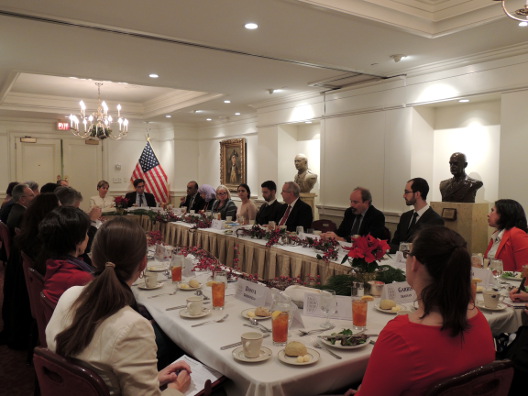 At a time when Gulf concerns about the recent US nuclear deal with Iran are high, the Atlantic Council’s Rafik Hariri Center for the Middle East and the Brent Scowcroft Center on International Security hosted a luncheon with a select group of leading Gulf analysts, US government officials, and foreign government representatives on the state of US-Gulf relations and the need to tackle fraying US-Gulf ties with creative new policies, including a more frank and sustained dialogue about the future.
At a time when Gulf concerns about the recent US nuclear deal with Iran are high, the Atlantic Council’s Rafik Hariri Center for the Middle East and the Brent Scowcroft Center on International Security hosted a luncheon with a select group of leading Gulf analysts, US government officials, and foreign government representatives on the state of US-Gulf relations and the need to tackle fraying US-Gulf ties with creative new policies, including a more frank and sustained dialogue about the future.
Hariri Center Senior Fellow Richard LeBaron outlined the arguments he makes in a newly released issue brief, Building a Better US-Gulf Partnership, to address the dynamics of the current US-Gulf relationship which, he argues, is overly transactional and focused on security. Bilal Saab, executive director of the Institute for Near East and Gulf Military Analysis (INEGMA) North America and McLarty Associates Managing Director Ali Tulbah commented on Ambassador LeBaron’s paper and his remarks with Atlantic Council Vice President and Director Barry Pavel of the Brent Scowcroft Center on International Security moderating the conversation.
LeBaron argued that although the United States and its Gulf partners might disagree about how to ensure a stable, prosperous Egypt, it is in all parties’ interest to promote economic development in Egypt. He also suggests that more steps could be taken to coordinate Gulf and US policies toward the transitioning countries, and a Gulf-led safety net program with the International Monetary Fund (IMF) could be developed for Egypt with the United States playing a quiet, technical assistance role. LeBaron pointed to a troubling paradox: despite state-of-the-art arms sales, frequent visits from US officials, and oft-stated promises that the United States will defend its Gulf allies, many in the Gulf are convinced that the United States is pivoting to Iran and would not hesitate to abandon its Gulf allies just as it abandoned former Egyptian president Hosni Mubarak. LeBaron concluded that rather than allowing Gulf states to drift away from our sphere of influence, we should work on developing deeper, stronger relationships with Gulf leaders that are not limited to defense.
The participants also debated whether the Gulf states are interested in such a dialogue with the United States and have the bandwidth to support one. Divergence of policy and opinion on the Syria conflict lingered as a probable cause for further strained tensions in the near future.
